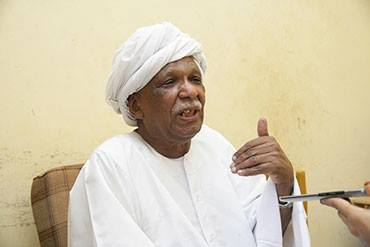Sudanese Communists reiterate opposition to set up FFC leadership body
September 16, 2019 (KHARTOUM) – The Sudanese Communist Party (SCP) has rejected any attempt to develop a structural framework for the ruling coalition of the Forces for Freedom and Change (FFC) that may lead to set up a leadership body, the party’s leader said.

In an interview with the Sudan Tribune on Monday, the SCP Political Secretary Mohamed Mokhtar al-Khatib declared his party’s opposition to the establishment of any leadership structure stressing that the FFC blocs are already formed of hierarchical forms.
“Therefore we prefer to have horizontal coordination between these blocks so that each force retains its independent entity and not be under the guardianship of others,” he said.
“We are forces of different ideas and programs that cannot be transformed into a party, because the hierarchical form leads the parties to lose their identity and independence. (While the horizontal coordination) allows every political organization to present and explain its positions to the masses,” he added.
He went further to say the coordination body should meet periodically to review the performance of three levels of government without dictum on its activities.
“Any guardianship over these institutions is dangerous,” he stressed.
The Communist party is a leading member in the bloc of the National Consensus Forces which regroups the leftist groups.
The other political blocs especially the Sudan Call say a strong leadership body is crucial for a successful transition to a democratic regime.
Some of them say the SCP is opposed to the restructuring of the FFC because they fear that Sadiq al-Mahdi, the Sudan Call chairman and leader of the National Umma Party would be elected at the head of the large coalition.
“To reassure them we have proposed a rotating leadership or any form they see good with them but a structural framework is needed at this stage,” said an FFC official who preferred not to be identified.
PARTICIPATION IN THE GOVERNMENT
Regarding his party’s participation in the transitional institutions, the Political Secretary said his party has clearly indicated that it would not be part of any level of governance including the transitional parliament.
“Our position was based on the fact that the forces that dominated the government, and I mean the military council, and their backers, are not moving towards a real solution to the Sudanese crisis or the realization of a civilian state,” he said
“The agreements concluded between the forces of change and the military council reflect the control of the military on everything, but emptying the transitional cabinet of all elements of strength,” he added.
Al-Khatib pointed to the Rapid Support Forces saying they cannot accept this notorious militia continues to be part of the Sudanese army. In the same vein, he said the ministers of defence and interior are chosen by the military component of the transitional authority and “this means that all the pillars of forces are in the hands of the military”.
He said that the security committee of the former regime has overthrown and deceived al-Bashir “to preserve the gains of parasitic capitalism” and secure its presence in the arena so that it can work to get to power again.
“All of this has made us stand to reject this document and its purposes”.
“We call for a democratic civil state that has full mandate to realizes the transition and implements reforms that create the conditions for an inclusive national constitutional conference attended by all the people of Sudan to resolve the general crisis that has accumulated since independence until today. This crisis is the cause of all the problems and backwardness in the Sudan of poverty and dependency (to foreign powers),” he said.
(ST)
